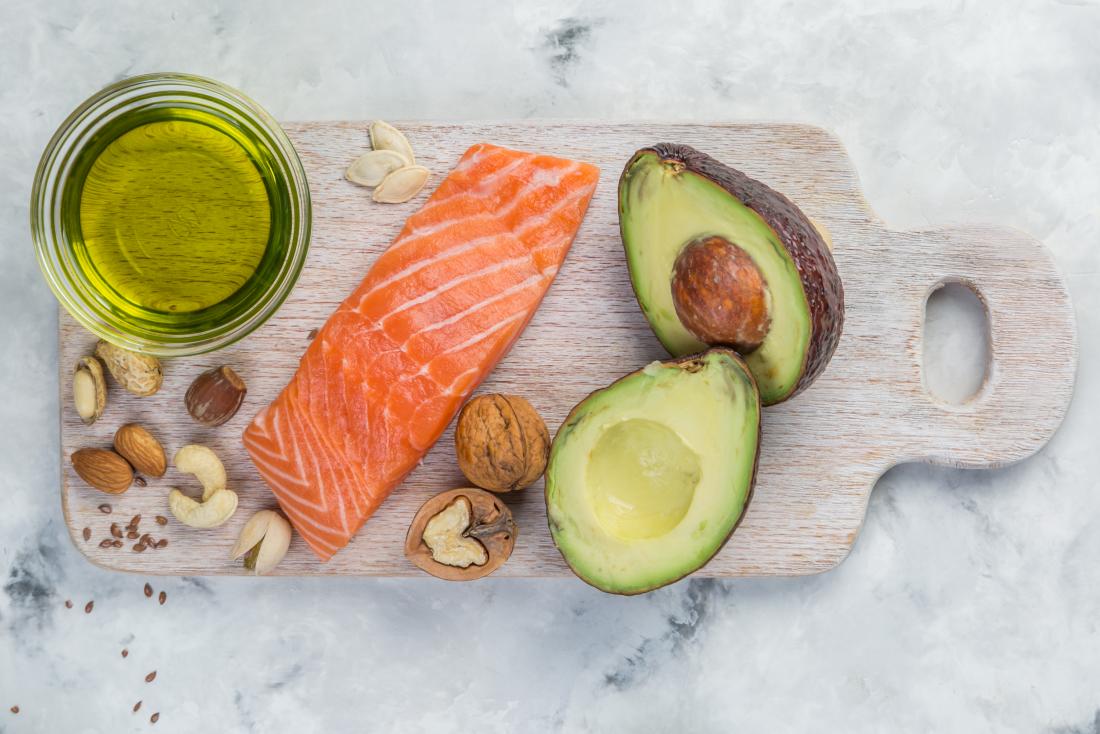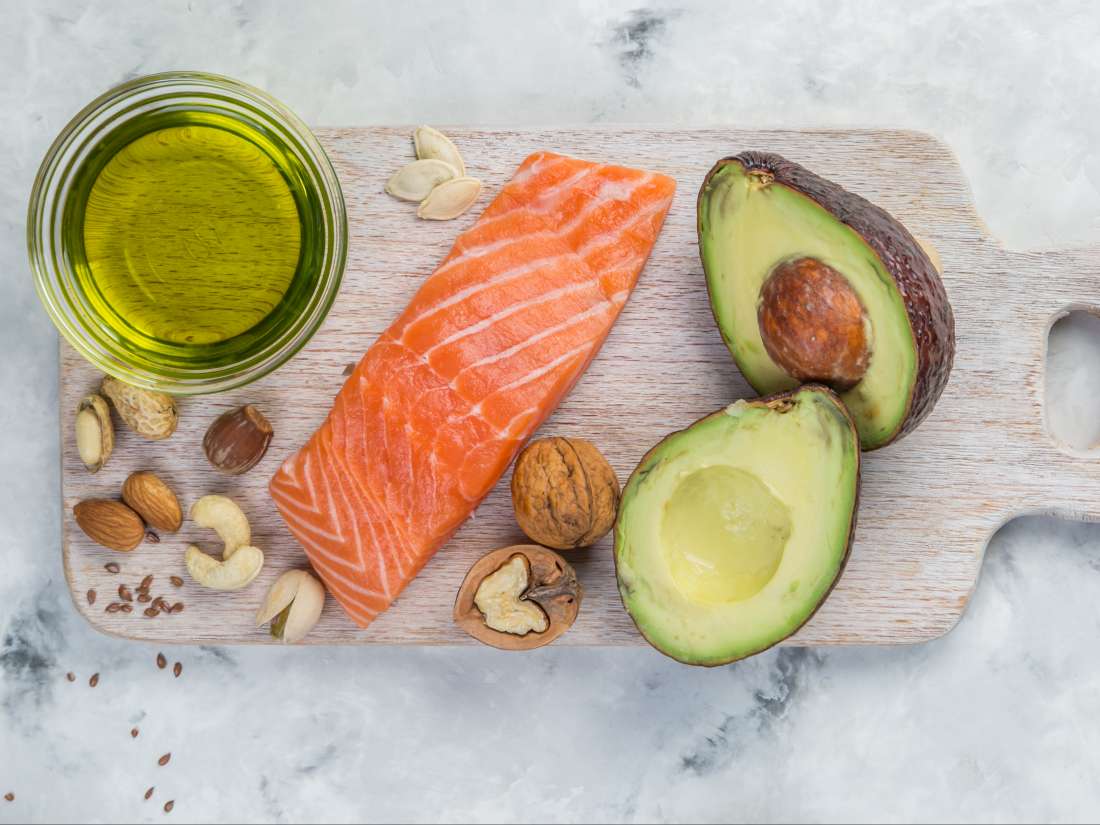Carbohydrates or carbs raise blood glucose more than other foods, meaning the body must produce more insulin to digest them.
Reducing carb intake can help stabilize blood glucose. It may also counteract some other effects of diabetes, such as weight gain and heart disease.
Despite this, low-carb diets also carry some risks, including vitamin and mineral deficiencies. For some people, low-carb diets are challenging to stick to over time.
In this article, learn more about a low-carb diet for people with diabetes. People should remember to speak to a doctor before making significant dietary changes, especially ones that affect diabetes management.
Carb recommendations

A low-carb diet could include lean protein, nuts, and avocado.
There is no longer any expert-recommended standard carb intake for people with diabetes.
A person’s carb needs vary with their activity level, weight, health goals, and other factors. Working with a doctor or dietitian can help people set specific carb targets.
A very low-carb diet includes just 30 grams (g) or less per day. Low-carb diets include 130 g or fewer of carbs, while moderate-carb diets include between 130 and 225 g of carbs.
To get an idea of how significant a change in diet will be, people can try counting their daily carb intake for a few days, then set a new target.
Another strategy — which may be more sustainable — is to slowly and steadily reduce carb intake and see how blood glucose levels change.
For example, a person might replace their morning toast with a hard-boiled egg, then slowly replace other carbs with further nutrient-rich alternatives.
Foods to eat and avoid
Most of the calories in a low-carb diet should come from healthful, natural sources, including:
- vegetables
- lean protein, such as eggs, fish, nuts, and tofu
- good fats, such as olives or avocados
- fruit in moderation
People following a very low-carb diet may wish to limit fruit intake since fruit also contains sugar. For most people, however, fruit is a healthful substitute for sugary snacks and processed foods.
As part of a healthful, low-carb diet, people should avoid or limit intake of the following:
- processed foods, such as prepackaged meals and salty snacks
- sugar-rich foods, such as cakes, candies, pastries, cookies, sodas, and juices
- starches, especially white bread or bagels
- alcoholic beverages
- potatoes, including potato chips
- other starchy vegetables
- white pasta
Whole-grain bread, lentils, and beans are also high in carbs, but they can be a vital part of a healthful diet. Eat these foods in moderation or as a substitute for unhealthful carbs, such as cakes and pies.
Meal plan

Pizza with a cauliflower crust is a simple idea for a low-carb meal.
When devising a low-carb meal plan, it is useful to know how many calories a person needs each day and to stay within that range. Daily calorie intake varies depending on a person’s height, weight, and activity level.
Learn more about individual calorie intake needs in this article.
Variety can help make meals more enjoyable, so a person may wish to develop a list of tasty low-carb options.
Some simple ideas for meals include:
Breakfast
- hard-boiled eggs
- low-sodium cottage cheese
- sliced avocados
- fiber-rich smoothies with avocado, frozen berries, and a banana
- low-fat yogurt
- eggs and vegetables fried in extra virgin olive oil
Lunch and dinner
- baked or grilled chicken
- cauliflower rice with vegetables and tofu
- salmon
- salad with toasted nuts
- zucchini noodles
- bunless hamburgers or cheeseburgers
- pizza with a cauliflower crust
- chicken stuffed with vegetables and cheese
- whole-grain pasta with vegetables or fish
- tuna, including packaged tuna and tuna steaks
- spaghetti squash stuffed with vegetables
- eggplant lasagna
Snacks
- nuts
- fruit
- hummus and vegetables
- string cheese
- beef jerky
- olives
- dark chocolate
- kale chips
- apples and peanut butter
- steamed edamame
- sardines
How do carbs affect diabetes?
A low-carb diet may be one of the most effective diabetes management strategies, especially for people who might be able to avoid medication.
Carbs elevate blood glucose more than any other food. For people with insulin resistance, blood glucose may remain elevated for hours after eating carbs.
For those with type 1 diabetes who do not produce enough insulin, carbs can also cause blood glucose spikes, so a low-carb diet may help people with both type 1 and type 2 diabetes.
Carbs can also affect a person’s health in other ways. Carb-rich foods tend to be high in calories but low in some important nutrients, such as protein. Eating too many of these “empty calories” can lead to weight gain.
Research shows that people who eat carb-rich foods may also feel more hunger between meals, causing them to overeat.
A low-carb diet may also:
- give a person more energy
- lower average blood glucose, or HbA1c levels
- reduce food cravings, especially for sugar
- lower the risk of hypoglycemia
- aid weight loss efforts
- decrease the risk of long-term diabetes complications
- lower cholesterol
Risks and considerations

A person should speak to a doctor or dietitian if they are considering a low-carb diet to manage diabetes.
Without proper planning, a low-carb diet can make it more difficult to get specific nutrients.
People on a low-carb diet may also eat large amounts of protein, which may accelerate kidney damage if they already have kidney disease.
Other risks include:
These risks may be due to eating too many processed protein sources, such as cold cuts and red meat. Limiting fruit and whole-grains can also be problematic if a person is not getting enough fiber.
Some people struggle to maintain a low-carb diet in the long term. Eating a low-carb diet may cause some people to feel hungry, moody, or have trouble concentrating.
Anyone who wants to try a low-carb diet to help manage diabetes may want to speak to a doctor or dietitian first, as healthcare professionals can help ensure they get all the nutrients they need.
Summary
A low-carb diet can help people with diabetes avoid complications. It can help keep blood pressure low, reduce energy slumps, aid weight loss, and even reverse the course of the disease.
For people who want to avoid medication or whose doctor has only recently diagnosed diabetes, a low-carb diet may be the first line of treatment.
Low-carb diets are not for everyone as an unhealthful low-carb diet — such as living off of fried, fatty meats — can be even more harmful to a person’s health than lots of carbs.
Likewise, a person must be able to stick with a low-carb diet long-term to fully reap its benefits.
Before trying any new diet, always talk to a doctor or dietitian. People can consider keeping a log of their symptoms and what they have eaten, to measure how the diet affects their health over time.
